Until now the banks have managed to keep themselves as a small target while interest rates were being hiked at the fastest pace in three decades. Community and political anger instead was directed at what Chalmers and his Labor colleagues like to call the “independent” Reserve Bank with all that pressure being piled on its governor Philip Lowe.
But with Lowe warning the official cash rate is poised to push even higher in coming months and the fix seemingly in for the RBA boss, it was a matter of time before Chalmers needed a new target.
Step forward Matt Comyn’s Commonwealth Bank with a 9 per cent jump in first-half cash profit to $5.15bn. The profit jump delivered on Wednesday makes great bait, with Chalmers ordering the Australian Competition and Consumer Commission to investigate banks for evidence of gouging of depositors with a report due at the end of the year. Of course deposits are more fluid than mortgages and all things being equal, savings will flow where the rate is best. Of course that doesn’t matter for Chalmers who made little noises around deposits when cash rates were next to zero.
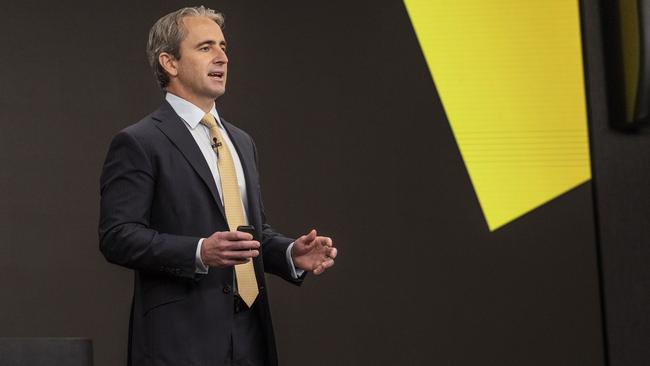
For his part Comyn says the last six months have seen the most intense competitive landscape in the Australian banking market for at least 20 years and this is expected to continue across both home loans and deposits.
CBA’s profit lift was indeed helped by a recovery in interest margins from the wafer thin level of the emergency low cash rate settings, but competition in a slowing mortgage means margins are still below the level just before Covid hit.
In reality for the past two years the big four banks have been stuffed full with deposits as Australians had nowhere else to stash their cash. Households are sitting on an additional $300bn in savings which is helping to ease the blow of higher day-to-day costs. The fight for deposits has really been happening at the smaller end with the big four so far sitting out.
But CBA issued a warning that’s as good as it is going to get for bank profit margins with the cost of wholesale funding now to shift higher as banks around the world scramble to refinance their cheap Covid cash. This means local banks will return back to lower cost domestic deposits to fund their lending book. That warning was behind the hammering on CBA shares, which were off nearly 6 per cent on session.
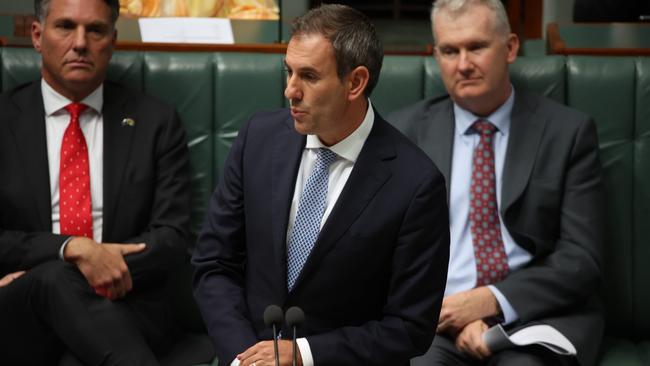
There is different pricing across different parts of the market with CBA offering 4 per cent on some of its shorter-term savings products. But it pays for customers to shop around with smaller rivals such as BoQ offering up to 4.75 per cent on some savings products.
When the ACCC hands its report to Chalmers it is likely to confirm the deposit market is functioning as normal and there is little the government can do about legislating against customer inertia.
Comyn also points out mortgage customers shopping around have seen as much as a 30 basis point discount from their headline rate, which shaves off a full RBA rate hike.
Economy bellwether
As a proxy for the Australian economy CBA’s customers are showing next to no areas of customer strain. Even so Comyn topped up provisions to protect against future lending losses by $586m. There have been some small moves up on 90-day overdue payments for personal loans and credit cards but from low levels. Importantly arrears across mortgages remain rock bottom.
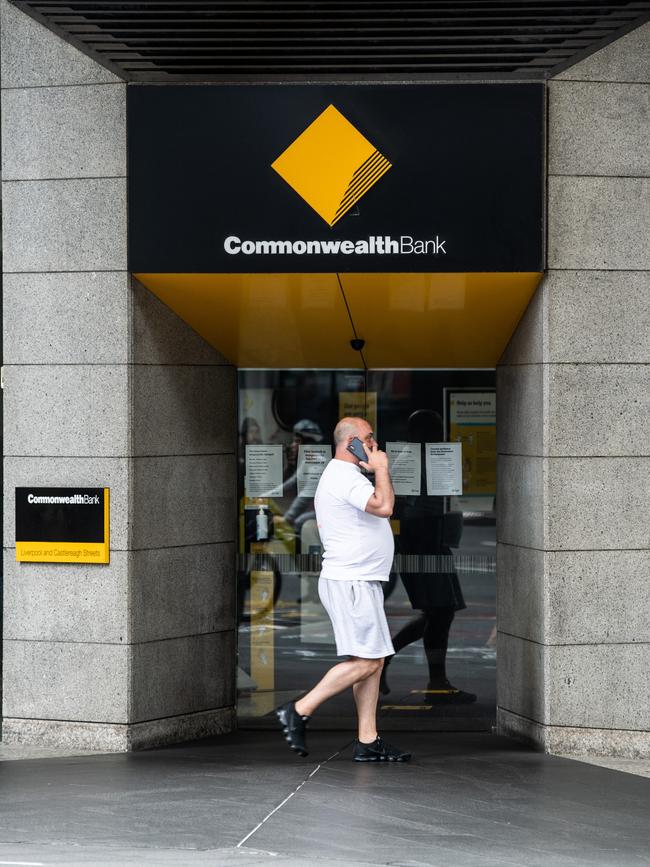
Customers are starting to change behaviour by drawing down savings and reducing spending, Comyn says. But this has not translated into customers falling behind repayments.
His bank is tipping the cash rate to peak at 3.85 per cent and housing prices to fall in the current cycle 15 per cent from peak to trough. Comyn believes the pace of housing price decline has actually slowed.
Underscoring the confidence in the economy the CBA outlined a $1bn share buyback. As a rule banks don’t return cash to investors if they are worried about the economy.
However, Comyn does have sympathy for the “understandably unpopular” treatment of interest rate hikes the RBA is giving to the economy.
“One of the challenges for the central bank is that if inflation is allowed to persist at a higher level for longer, it is harder to unwind. And so they’re trying to take steps to bring that inflation down. Of course those decisions are difficult and they cause concern and worry for our customers,” he says in an interview.
Wesfarmers caught out
Even the best run old world businesses can struggle in getting their feisty tech operations to find their momentum and Rob Scott’s Wesfarmers is no exception.
The industrial muscle of Wesfarmers that extends to retail powerhouse Bunnings, Officeworks and late bloomer Kmart has been confounded when it comes to growing online retail marketplace Catch.
Tens of millions of dollars has been spent on reshaping Catch since Scott spent $230m buying the e-commerce play 2019 but returns have fallen well short of expectations. Since then Catch has more than $233m in accumulated losses.
Catch, which started out offering daily deals and everyday goods flash sales site, is now positioning itself as Australia’s online superstore.
It got a strong sales bump during the first year of Covid-19 lockdown but was unable to carry that momentum into the second year, where sales flatlined at just under $1bn and active customers remained stuck at 2.8m. Wesfarmers responded by investing more people and resources into Catch early in the pandemic.
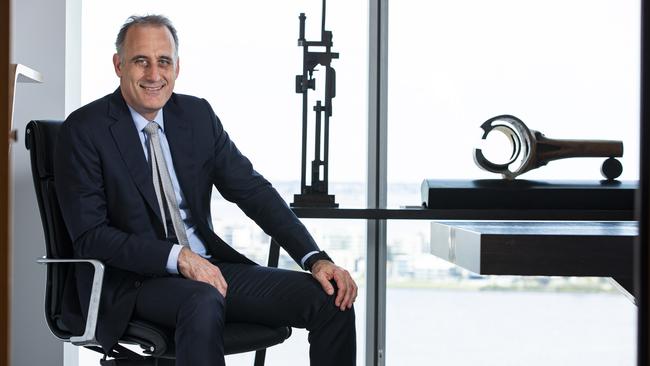
Wesfarmers latest accounts released Wednesday show sales went backwards by nearly 30 per cent in the December half, although that also reflects a rush by Australians back to bricks and mortar shopping following the Covid years.
Even so Wesfarmers, which prides itself on generating returns across its retail and manufacturing operations has taken aggressive steps. Earlier this year outlined plans to axe one-in-three jobs at Catch and write down lazy stock. Late last year it appointed former top Cotton On executive Brendan Sweeney as the new managing director to drive it back to growth.
But the shake-up has been costly, with losses ballooning to $108m in the December half. Catch is expected to post another loss in the June half although at a narrower rate.
Scott concedes mistakes were made with Catch, particularly in the early days as Covid wave hit, but the fundamentals of the proposition remain strong.
Wesfarmers Scott says the problems encountered at Catch have not been uniquely tech or digital issues or even cultural by buying a start-up. Rather they come down to retailing 101 extending to range, inventory management, and supply chain issues. This is what makes him confident of being able to address the issues.
“Our core team are all very, very experienced digital retailers with local experience in Australia, and we see a path for improvement,” Scott tells The Australian.
Catch is starting to play a bigger role in Wesfarmers beyond just being an e-commerce play. Its platform is starting to power the back end for digital retailing across Kmart and Target. There is also the data opportunity as Wesfarmers rolls out its OnePass rewards scheme that covers Wesfarmers retailing operations including Bunnings.
More broadly, Scott says Wesfarmers is navigating the economy which is starting to feel the pinch of higher interest rates. In particular the Kmart discount department store saw a surge in sales during the December half as shoppers became more price conscious.
Bunnings drove a 6.3 per cent increase in top line sales, Kmart and Target combined delivered 24.5 per cent and Officeworks sales were up 4.6 per cent. Wesfarmers delivered a 14.1 per cent jump in headline earnings to $1.38bn and in a sign of confidence pushed up dividend by 8 cents to 88c a share.
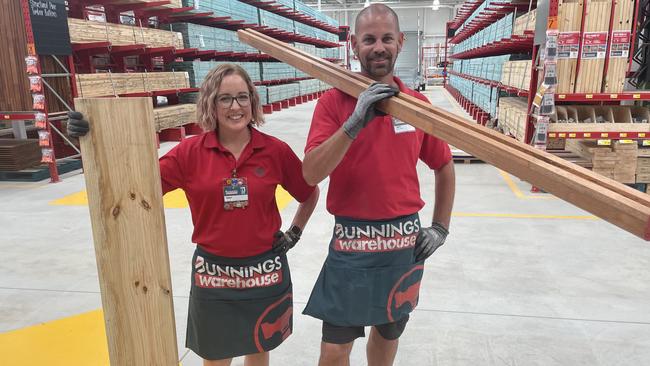
Scott says while the higher interest rates are pinching households there’s “still a degree of resilience” within the Australian economy.
“Importantly, we still have very low levels of unemployment. Virtually everyone that wants a job has got a job … and I think that is a really important feature of the economy.
He believes a “normalisation” of spending compared to the Covid years, but employment figures will be the ones to watch. As long as people are working they will have the confidence to spend, although consumers will clearly be more price conscious in the coming period.
“We feel reasonably confident that we can maintain momentum, even if we were to see more challenging times”.
Scott has also called out the cost wave that is also hitting business as well as households. But Australia can no longer blame offshore pressures with much of the cost hikes now coming down to domestic issues. This revolves around wage and labour availability, higher transport costs and energy prices.
Navigating these will be a big focus for Scott and his management team in the coming year. Particularly as construction of the Mt Holland lithium mine pushes ahead and costs blow out. It is already taking its toll, with Wesfarmers pushing up expected capital expenditure spending to between $1bn and $1.2bn.








It has taken Jim Chalmers less than a year to discover how useful the big four banks can be when it comes to a political distraction.